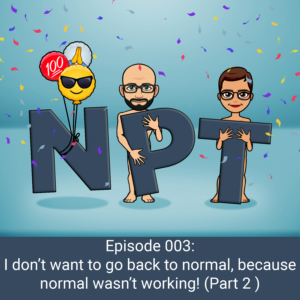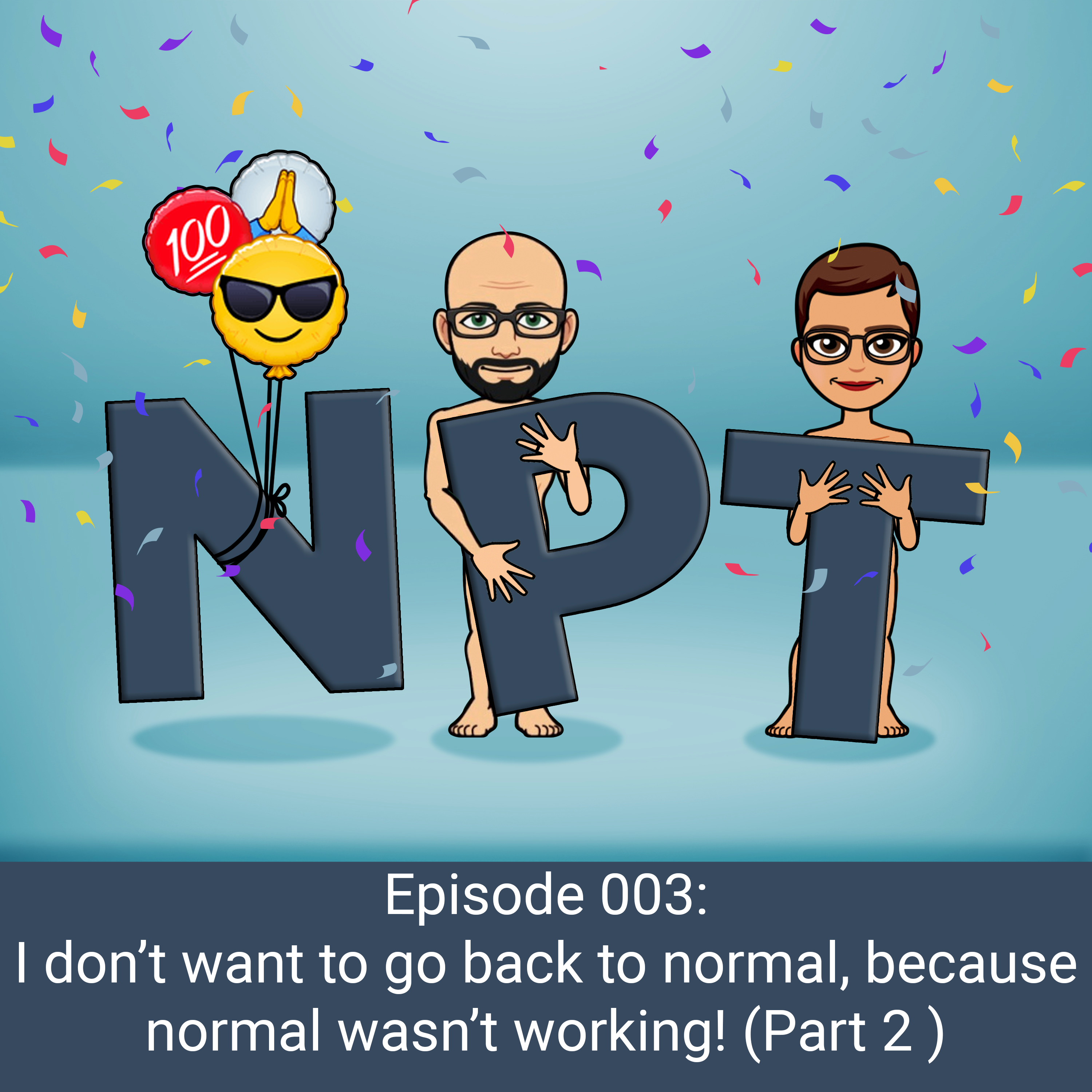 In Episode 003, Jeff and Sabrina dive deeper into the first two things they don’t want to go back to normal on from our Pre-COVID world; financial health and physical health.
In Episode 003, Jeff and Sabrina dive deeper into the first two things they don’t want to go back to normal on from our Pre-COVID world; financial health and physical health.
If you missed part one of this four-part series in Episode 002, please go back and listen to that. Episode 002
In Episode 002, we introduced six things from our Pre-COVID world that we don’t want to go back to normal on. Financial health, physical health, emotional/mental health, spiritual health, relational health, and speed of life…health. (Inside joke from this episode) In the final three episodes of this series, we’ll do a deeper dive into each subject, looking at solutions and practical next steps.
In the content, we answered two listener questions:
Cynthia asked, “Where do you suggest starting when your debt is out of control? What tips do you have to budget together as a couple?”
Jenni asked, “How do you motivate yourself to stay disciplined, especially when it comes to physical fitness? I see your posts about running and staying active…just wondering what gets you motivated to keep it up. Looking for some inspiration!”
1. How do we not go back to normal financially?
“Saving is not a dollar amount you have, it’s a discipline in which you live.” – Jeff
A. Choose no more debt
“You have to make the decision ‘we will not have debt again.’ From here on out, we’re not adding any more debt. You have to start there.”
“The average car payment in America is $471.50. At an average of $471.50 a month for a car payment, in 6 years, which is the common length of a loan, that would be $33,948 I could save. That’s not counting the residual costs of a newer car loan like full coverage insurance and higher tax and registration costs. Even if I spent $15,000 on repairs for my paid for cars, I still would save $18,948 in six years. You can’t beat that math.”
B. Live on a budget
As Joe Sangl says, “Income – outgo = Exactly Zero (TM)” I Was Broke, Now I’m Not
“(Jeff) We budget to zero. We tell every dollar where to go. We make savings an expense in our budget. (Sabrina) Hey, if you want to be in control of something, be in control of telling your money where to go.”
“I actually believe that discretionary income is just as valuable as cash in the bank. It’s one thing to have a savings account. It’s another thing to have expenses that are far less than what you make. That way if you have to change jobs, or your income changes, you aren’t spending everything you bring in.”
“I’d rather have financial freedom than a new car with a recurring payment.”
“If you don’t tell your money where to go it will find a place to go, and it’s usually not into savings or to pay off debt.”
C. Make savings a priority
“We live on the 10-10-80 model. We give at least the first 10% of our gross income to God through our church as a tithe. We’ve always tithed.”
Malachi 3:8-10 “Should people cheat God? Yet you have cheated me! “But you ask, ‘What do you mean? When did we ever cheat you?’ “You have cheated me of the tithes and offerings due to me. 9 You are under a curse, for your whole nation has been cheating me. 10 Bring all the tithes into the storehouse so there will be enough food in my Temple. If you do,” says the Lord of Heaven’s Armies, “I will open the windows of heaven for you. I will pour out a blessing so great you won’t have enough room to take it in! Try it! Put me to the test!
“When you save money you are literally paying yourself. You’re paying yourself for a future need that you can’t see yet. But when it happens, you’ll have the money for it.”
“An initial emergency savings account is more important than paying off debt. Here’s why. If you don’t have savings but you have an emergency, what will you do? Put it on your credit card.”
D. Get out of debt
Use the debt snowball.
www.daveramsey.com www.iwbnin.com www.josephsangl.com
Sell crap.
Downsize.
Do a spending fast.
E. Continue to be educated
“You have to have financial mentors in your life.”
2. How do we not go back to normal physically?
“One of the biggest game-changers for me was realizing that the way I cared for my body was an act of worship to God. Ultimately, working out is not about looking better, it’s about honoring God.”
Romans 12:1 And so, dear brothers and sisters I plead with you to give your bodies to God because of all he has done for you. Let them be a living and holy sacrifice—the kind he will find acceptable. This is truly the way to worship him.
1 Corinthians 6:20 for God bought you with a high price. So you must honor God with your body.
A. Start moving
“If we would just be a little bit more active, it would help in a lot of this. 21 minutes a day of moderate-intensity cardio a day is what is recommended as a starting point.”
B. Change your intake
“80% of our physical health is the way we eat, and 20% is working out.”
Stop drinking soda or sugary drinks.
Divide your total weight by 2 and drink that many ounces of water a day.
Drink one cup of water for every cup of coffee you drink.
C. Accountability
Have someone who will work out with you or hold you accountable to working out and the way you eat.
D. Get the right amount of sleep at the right time
